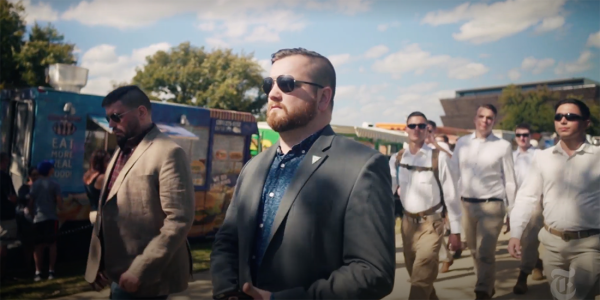

Elliott Kline decided he needed to get serious about his neo-Nazism when he saw a neo-Nazi hero get punched.
Kline, a human resources administrator by day, had already changed his name to Eli Mosley — an homage to British fascist Oswald Mosley, the sad-sack, upper-crust twit who extravagantly tried to get England to love Nazism after the Second World War. But then, leading American white supremacist Richard Spencer got sucker-punched by a protester on the streets of Washington at Donald Trump’s inauguration.
“I was pissed off, because I was like if had already found [Spencer] or I was already there, that wouldn’t have happened,” Eli told the New York Times, which profiled him in a video documentary, embedded below. “We are a group of well-mannered, good looking young white people who have something to say.”
Eli dove headfirst into the cause of white supremacy — protecting the boss, doing news interviews, ordering khaki-and-white-oxford-clad snowflake armies in Charlottesville when to light their torches. And he rose fast, becoming an articulate, clean-cut spokesman for the white right when media outlets came looking for a leader among the racists.
It helped that he was an Iraq vet, who talked often about his experience. “I went from Kuwait to Baghdad back and forth and then we did a little bit on the, uh, the east border over by the, uh, by Iran,” he said on a Holocaust-denying podcast.
Except Eli wasn’t a clean-cut spokesman; he was a slur-spouting, run-of-the-mill bigot on the internet, where he went by the handle “Judenjager” — Jew-hunter.
And he never deployed to Iraq, or anywhere else. In fact, the Times learned from Army records and Eli’s former fellow soldiers, he served in the Pennsylvania National Guard “but quit before his contract was up.”
Video screenshot courtesy of The New York Times

That’s not insignificant. Eli has been telling media outlets that the military is a big feeder for white supremacist groups. Emma Cott, a New York Times videographer who followed Eli and his Aryan comrades, summed it up thusly:
After a short time filming behind the scenes with Eli and his associates, a theme emerged. He kept emphasizing a connection between the military and the alt-right. He said many of his compatriots were veterans of the wars in Iraq and Afghanistan who had become disillusioned with the American political system after fighting in unwinnable conflicts. In his telling, members of the alt-right were patriotic Americans who had come to their extreme worldview through honorable life experience, not hatred.
Eli’s argument may have been more wish than reality, given that service members consider white nationalism a bigger security threat to the United States than Afghanistan or Iraq, but journalists have been willing to carry Eli’s message of white discontent in the ranks, based on his service credentials.
Even if he’d been a war hero — and he was not — those journalists could’ve figured out pretty quickly that Eli’s a run-of-the-mill profane bigot, as Cott learned when she studied that podcast Eli liked to chat on. Here’s a sample of his unvarnished thoughts:
I work in HR firing niggers and spics all day. Before that I was in the army and I got to kill Muslims for fun. I’m not sure which one was better, watching niggers and spics cry they can’t feed their little mud children or watching Muslims’ brains sprayed on the wall. Honestly both probably suck compared to listening to a kike scream…
In interviews with Cott, though, he was remarkably more docile… especially when he was getting owned on his service. Here’s one of their conversations before Cott obtained Eli’s military records:
Cott: Sorry, did you say you were in Iraq?
Eli: Yes.
Cott: How long were you there?
Eli: Only three mon- er, only nine months.
Cott: Oh. Was it nine or three?
Eli: Well, I went to Kuwait for a little bit, for three months, and it wasn’t really Iraq… and it was toward the end parts, the demobilization period. ‘Cause I only graduated high school in 2010.
Cott: Right. Can you just say, like in a full sentence, how long you were in the Army?
Eli:
See that moment for yourself in the video, in 12:25. It’s well worth it. And at the end, there’s this gem of a phone conversation, after Cott has reviewed Eli’s National Guard record and spoken to soldiers who served with him:
Cott: So did you go to Iraq?
Eli: I was in Kuwait, I told you that before.
Cott: You told me you went to Kuwait and then you went to Iraq.
Eli: Well they’re, they’re basically, it’s the sa– it’s uh, very similar the way it works.
Cott: So what are the dates that you were there?
Eli: Um. Let me think. Hold on, I’m trying to find out. 2012, I believe, but I gotta look.
Cott: Because the last troops left Iraq in the end of 2011…
On one hand, it’s an extremely fine point to deride for stolen valor a neo-Nazi who jokes gleefully about gassing Jews, starving black and Latino people, and shooting Muslims. On the other hand, watch that racist piece of crap twist in the wind as he realizes he can’t pile the shit any higher. It is glorious.
Will Eli’s grift matter? Probably not to his fellow Dixie-singing, AR-15-caressing, mayonnaise-loving buddies. As Cott points out in her documentary, being full of shit is sort of a prerequisite for being an American Nazi:
The more that people like him come out into the open, the more they reveal the alt right for what it really is. It’s a movement where 30 people with cheap tiki torches can seem like an army in the echo chamber of social media. Where white men claim to be the real victims. And where a weekend warrior can pass himself off as a disillusioned veteran of war.